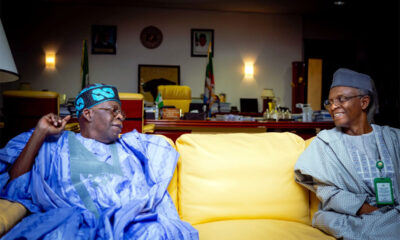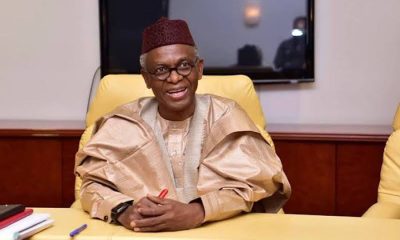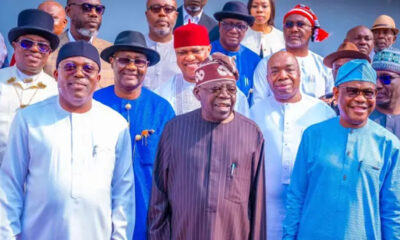Opinion
Tinubu wants even broke universities to fund him – Farooq Kperogi
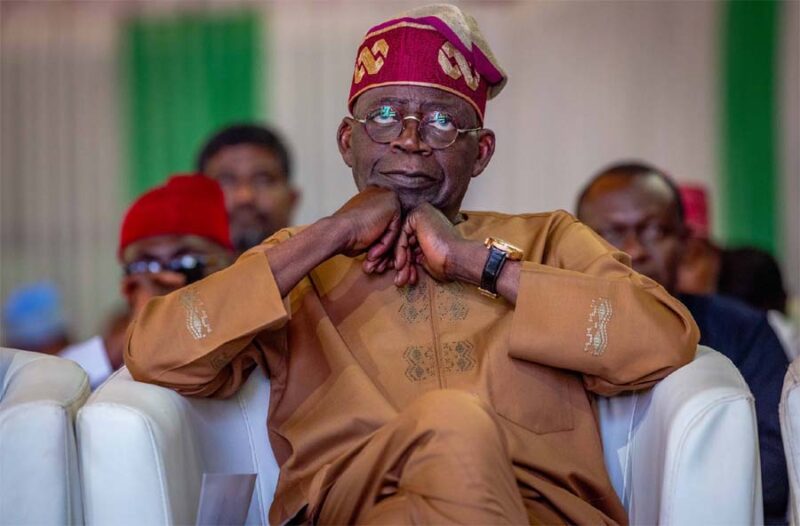
Tinubu wants even broke universities to fund him – Farooq Kperogi
President Bola Ahmed Tinubu is really having a ball—at the expense of the rest of Nigeria. He has become so comfortable in his presidential self-indulgence that he now wants to wring water from stones and deposit it into an ocean. Our stone-broke universities are the stones. The presidency is the ocean to which Tinubu wants to pour the water he wants to extract from stones.
It wasn’t enough that he signed a N2.176 trillion Supplementary Appropriation Act on Wednesday in Abuja mostly to fund decadent presidential pleasures, such as $38 million for the presidential air fleet, $6.1 million for a presidential yacht, and even more millions of dollars for presidential “repairs,” presidential feeding, foreign SUVs for the First Lady’s office and for legislators, etc.
Now, he wants struggling, cash-strapped federal universities that are barely surviving to turn over 40 percent of all their internally generated revenue to the federal coffers to fund more presidential sybaritism and elite indulgence. I didn’t believe it when someone first called my attention to it.
The LEADERSHIP newspaper reported this week that the Accountant- General of the Federation by the name of Mrs Oluwatoyin Madein sent a memo to all federal universities titled “Implementation of 40% Automatic Deduction from Internally Generated Revenue of Partially Funded Federal Government Institutions.”
Signed on her behalf by Felix Ore-ofe Ogundairo, the director of Revenue & Investment in the Office of the Accountant-General of the Federation, the memo said, “I am directed to inform you that the Honourable Minister of Finance and Coordinating Minister of the Economy (HMF&CME) has approved the implementation of a 40% auto deduction from the Gross Internally Generated Revenue (IGR) of all Partially Funded Federal Government Institutions in line with the Provision of Section 62 of Finance Act, 2020 with effect from November, 2023.
READ ALSO:
-
Israel must stop killing babies, women in Gaza – Emmanuel Macron
-
FG revokes houses allocated to NHP subscribers
-
Excitement as race for 2023 NAJA Auto Awards begins
“Agencies/parastatals to not more than 50% of their gross IGR and the remittance of 100% (hundred percent) of the remaining 50% (fifty percent) to the Sub-recurrent Account. While all statutory revenue lines like Tender Fees, Contractor’s Registration Fees, Disposal of Fixed Assets, Rent on Quarters, etc shall be remitted 100% (hundred percent) to the Sub-recurrent Account.
“Consequently, all partially funded Agencies/Parastatals must align their budget requirements and ensure total compliance with the provision of Section 62 of Finance Act, 2020 and Finance Circular, 2021.”
This makes absolutely no sense at all. I am not talking of the blindingly poor grammar of the memo. The memo concedes that federal universities are merely “partially funded” by the federal government. That’s an acknowledgement of their financial precarity since they are supposed to be fully funded by the federal government, which established them.
In order to survive and live up to the demands of their mandate in spite of progressively vanishing support from the federal government that set them up, many universities devised creative and not so creative strategies to generate funds to stay afloat, which aren’t even sufficient. Now a government that has beaten every known record for eyewatering presidential profligacy wants to share in whatever little money financially distressed universities were able to raise to keep them from going under.
This is a wantonly cruel suffocation of federal universities that are barely hanging on! It betrays not just a profound poverty of imagination but a studied design to snuff out the last evidence of life in our universities. Since children of the elite no longer attend public universities in Nigeria, it’s easy to see why the government wants to kill them by stealth.
It’s a continuation of the conservative, right-wing, anti-people, neoliberal orthodoxy that is obviously the governing philosophy of the Tinubu administration. It’s probably also a pre-emptive move against legitimate demands for the funding of federal universities since the administration has said it has now saved trillions of naira from the removal of petroleum subsidies.
The initial argument was that money saved from the removal of petrol subsidies would be invested in education and infrastructure. That has turned out, at least so far, to be a big fat lie, as some of us had predicted. The money is instead being used to pay for the hedonic thrills and delights of people in power while the majority of the population sinks irrecoverably into the abyss of misery and deprivation.
But someone needs to tell honchos of the Tinubu administration that universities are not money-making enterprises. They are social services. Social services are an investment in the people, not revenue-generating ventures to fund the government. It’s sad that this needs to be pointed out.
READ ALSO:
- 16-Year-old girl raped after getting drunk during Church celebration in Ogun
- Kogi guber: Police withdraw security escort from VIPs
- One killed as terrorists abduct Islamic cleric from Ghana during Maolud procession in Katsina
Every single country on earth that transitioned from backwardness and stagnancy to success and progress has had to invest enormously in its universities. For example, Singapore’s transition from a Third World to a First World was enabled by its investments in its universities.
Singapore has now become a hub for education in Asia, and is known for its world-class faculty, cutting-edge research facilities, and strong emphasis on innovation. It didn’t happen overnight or by mere wishes. It happened because the government of Singapore has consistently invested in its universities.
South African universities are world-class and drive the country’s development because the central government there has committed massive resources to the higher education sector. Public universities receive substantial funding from the government, which is responsible for their high academic reputation, significant research output, and impressive contribution to national growth.
India, the world’s most populous country, with its large and diverse higher education system, has several well-funded public universities that are the drivers of the country’s match to greatness. Institutions like the Indian Institutes of Technology (IITs) and the Indian Institutes of Management (IIMs) receive substantial government support, which enables them to excel in technology, management, and research.
China has the second largest economy in the world after the United States. One of the secrets for its transition from dingy deprivation a few decades ago to gleaming prosperity now is the significant increase it made over time in its investment in its higher education sector. Top public universities like Tsinghua University and Peking University receive substantial government funding, which arms them with the arsenal to compete globally in terms of research output and academic excellence.
It speaks to the lack of foresight and self-interestedness of the ruling elites in Nigeria that instead of investing in our universities with an eye to the future, they want to squeeze money out of them—and with it the last vestige of life in them.
This is governance by banditry. How do you ask institutions you should fund but that you have starved of funds for decades to turn around to fund you? Where in the world does that happen?
The government is, in other words, asking federal universities to self-annihilate, to self-immolate, in order to feed an already overfed and overpampered federal government whose only reason for existence seems to be to indulge in hedonistic frivolities amid widening existential torment brought about by its own incompetence and cruelty.
Tinubu wants even broke universities to fund him – Farooq Kperogi
Farooq Kperogi is a renowned Nigerian newspaper columnist and United States-based Professor of journalism.
Opinion
El Rufai’s Arise News mind game with Ribadu, By Farooq Kperogi

El Rufai’s Arise News mind game with Ribadu, By Farooq Kperogi
El Rufai’s Arise News mind game with Ribadu, By Farooq Kperogi
Opinion
Oshiomhole: Behold the 13th disciple of Christ

Oshiomhole: Behold the 13th disciple of Christ
Opinion
AFCON 2025: Flipping Content Creation From Coverage to Strategy

AFCON 2025: Flipping Content Creation From Coverage to Strategy
By Toluwalope Shodunke
The beautiful and enchanting butterfly called the Africa Cup of Nations (AFCON) emerged from its chrysalis in Khartoum, Sudan, under the presidency of Abdelaziz Abdallah Salem, an Egyptian, with three countries—Egypt, Sudan, and Ethiopia—participating, and Egypt emerging as the eventual winner.
The reason for this limited participation is not far-fetched. At the time, only nine African countries were independent. The remaining 45 countries that now make up CAF’s 54 member nations were either pushing Queen Elizabeth’s dogsled made unique with the Union Jack, making supplications at the Eiffel Tower, or knocking at the doors of the Palácio de Belém, the Quirinal Palace, and the Royal Palace of Brussels—seeking the mercies of their colonial masters who, without regard for cultures, sub-cultures, or primordial affinities, divided Africa among the colonial gods.
From then until now, CAF has had seven presidents, including Patrice Motsepe, who was elected as the seventh president in 2021. With more countries gaining independence and under various CAF leaderships, AFCON has undergone several reforms—transforming from a “backyard event” involving only three nations into competitions featuring 8, 16, and now 24 teams. It has evolved into a global spectacle consumed by millions worldwide.
Looking back, I can trace my personal connection to AFCON to table soccer, which I played alone on concrete in our balcony at Olafimihan Street—between Mushin and Ilasamaja—adjacent to Alafia Oluwa Primary School, close to Alfa Nda and Akanro Street, all in Lagos State.
Zygmunt Bauman, the Polish-British sociologist who developed the concept of “liquid modernity,” argues that the world is in constant flux rather than static, among other themes in his revelatory works.
For the benefit of Millennials (Generation Y) and Generation Z—who are accustomed to high-tech pads, iPhones, AI technologies, and chat boxes—table soccer is a replica of football played with bottle corks (often from carbonated drinks or beer) as players, cassette hubs as the ball, and “Bic” biro covers for engagement. The game can be played by two people, each controlling eleven players.
I, however, enjoyed playing alone in a secluded area, running my own commentary like the great Ernest Okonkwo, Yinka Craig, and Fabio Lanipekun, who are all late. At the time, I knew next to nothing about the Africa Cup of Nations. Yet, I named my cork players after Nigerian legends such as Segun Odegbami, Godwin Odiye, Aloysius Atuegbu, Tunji Banjo, Muda Lawal, Felix Owolabi, and Adokiye Amiesimaka, among others, as I must have taken to heart their names from commentary and utterances of my uncles resulting from sporadic and wild celebrations of Nigeria winning the Cup of Nations on home soil for the first time.
While my connection to AFCON remained somewhat ephemeral until Libya 1982, my AFCON anecdotes became deeply rooted in Abidjan 1984, where Cameroon defeated Nigeria 3–1. The name Théophile Abéga was etched into my youthful memory.
Even as I write this, I remember the silence that enveloped our compound after the final whistle.
It felt similar to how Ukrainians experienced the Battle of Mariupol against Russia—where resolute resistance eventually succumbed to overwhelming force.
The Indomitable Lions were better and superior in every aspect. The lion not only caged the Eagles, they cooked pepper soup with the Green Eagles.
In Maroc ’88, I again tasted defeat with the Green Eagles (now Super Eagles), coached by the German Manfred Höner. Players like Henry Nwosu, Stephen Keshi, Sunday Eboigbe, Bright Omolara, Rashidi Yekini, Austin Eguavoen, Peter Rufai, Folorunsho Okenla, Ademola Adeshina, Yisa Sofoluwe, and others featured prominently. A beautiful goal by Henry Nwosu—then a diminutive ACB Lagos player—was controversially disallowed.
This sparked outrage among Nigerians, many of whom believed the referee acted under the influence of Issa Hayatou, the Cameroonian who served as CAF president from 1988 to 2017.
This stroll down memory lane illustrates that controversy and allegations of biased officiating have long been part of AFCON’s history.
The 2025 Africa Cup of Nations in Morocco, held from December 21, 2025, to January 18, 2026, will be discussed for a long time by football historians, raconteurs, and aficionados—for both positive and negative reasons.
These include Morocco’s world-class facilities, the ravenous hunger of ball boys and players (superstars included) for the towels of opposing goalkeepers—popularly dubbed TowelGate—allegations of biased officiating, strained relations among Arab African nations (Egypt, Algeria, Tunisia, and Morocco), CAF President Patrice Motsepe’s curt “keep quiet” response to veteran journalist Osasu Obayiuwana regarding the proposed four-year AFCON cycle post-2028, and the “Oga Patapata” incident, where Senegalese players walked off the pitch after a legitimate goal was chalked off and a penalty awarded against them by DR Congo referee Jean-Jacques Ndala.
While these narratives dominated global discourse, another critical issue—less prominent but equally important—emerged within Nigeria’s media and content-creation landscape.
Following Nigeria’s qualification from the group stage, the Super Eagles were scheduled to face Mozambique in the Round of 16. Between January 1 and January 3, Coach Eric Chelle instituted closed-door training sessions, denying journalists and content creators access, with media interaction limited to pre-match press conferences.
According to Chelle, the knockout stage demanded “maximum concentration,” and privacy was necessary to protect players from distractions.
This decision sparked mixed reactions on social media.
Twitter user @QualityQuadry wrote:
“What Eric Chelle is doing to journalists is bad.
Journalists were subjected to a media parley under cold weather in an open field for the first time in Super Eagles history.
Journalists were beaten by rain because Chelle doesn’t want journalists around the camp.
Locking down training sessions for three days is unprofessional.
I wish him well against Mozambique.”
Another user, @PoojaMedia, stated:
“Again, Eric Chelle has closed the Super Eagles’ training today.
That means journalists in Morocco won’t have access to the team for three straight days ahead of the Round of 16.
This is serious and sad for journalists who spent millions to get content around the team.
We move.”
Conversely, @sportsdokitor wrote:
“I’m not Eric Chelle’s biggest supporter, but on this issue, I support him 110%.
There’s a time to speak and a time to train.
Let the boys focus on why they’re in Morocco—they’re not here for your content creation.”
From these three tweets, one can see accessibility being clothed in beautiful garments. Two of the tweets suggest that there is only one way to get to the zenith of Mount Kilimanjaro, when indeed there are many routes—if we think within the box, not outside the box as we’ve not exhausted the content inside the box.
In the past, when the economy was buoyant, media organisations sponsored reporters to cover the World Cup, Olympics, Commonwealth Games, and other international competitions.
Today, with financial pressures mounting, many journalists and content creators seek collaborations and sponsorships from corporations and tech startups to cover sporting events, who in turn get awareness, brand visibility, and other intangibles.
As Gary Vaynerchuk famously said, “Every company is a media company.” Yet most creators covering AFCON 2025 followed the same playbook.
At AFCON 2025, most Nigerian journalists and content creators pitched similar offerings: on-the-ground coverage, press conferences, team updates, behind-the-scenes footage, analysis, cuisine, fan interactions, and Moroccan cultural experiences.
If they were not interviewing Victor Osimhen, they were showcasing the stand-up comedy talents of Samuel Chukwueze and other forms of entertainment.
What was missing was differentiation. No clear Unique Selling Proposition (USP). The result was generic, repetitive content with little strategic distinction. Everyone appeared to be deploying the same “Jab, Jab, Jab, Hook” formula—throwing multiple jabs of access-driven content in the hope that one hook would land.
The lesson is simple: when everyone is jabbing the same way, the hook becomes predictable and loses its power.
As J. P. Clark wrote in the poem “The Casualties”, “We are all casualties,” casualties of sameness—content without differentiation. The audience consumes shallow content, sponsors lose return on investment, and creators return home bearing the “weight of paper” from disappointed benefactors.
On November 23, 1963, a shining light was dimmed in America when President John F. Kennedy was assassinated.
As with AFCON today, media organisations sent their best hands to cover the funeral, as the who’s who of the planet—and if possible, the stratosphere—would attend. Unconfirmed reports suggested that over 220 VVIPs were expected.
While every newspaper, radio, and television station covered the spectacle and grandeur of the event, one man, Jimmy Breslin, swam against the tide. He chose instead to interview Clifton Pollard, the foreman of gravediggers at Arlington National Cemetery—the man who dug John F. Kennedy’s grave.
This act of upended thinking differentiated Jimmy Breslin from the odds and sods, and he went on to win the Pulitzer Prize in 1986.
Until journalists and content creators stop following the motley and begin swimming against the tide, access will continue to be treated as king—when in reality, differentiation, aided by strategy, is king.
When every journalist and content creator is using Gary Vaynerchuk’s “Jab, Jab, Jab, Hook” template while covering major sporting events, thinkers among them must learn to replace one jab with a counterpunch—and a bit of head movement—to stay ahead of the herd.
Toluwalope Shodunke can be reached via tolushodunke@yahoo.com
-

 Education8 hours ago
Education8 hours agoCheck Your Name: UNILORIN Releases Updated NELFUND Refund List for 2024/2025 Students
-

 News3 days ago
News3 days agoAso Rock Goes Solar as Tinubu Orders National Grid Disconnection
-

 metro3 days ago
metro3 days agoLagos Police Launch Manhunt for Suspect in Brutal Ajah Murder
-

 Sports3 days ago
Sports3 days agoLookman Shines as Atlético Madrid Hammer Barcelona 4-0
-

 metro1 day ago
metro1 day agoBoko Haram Terrorists Release Video of 176 Abducted Kwara Residents
-
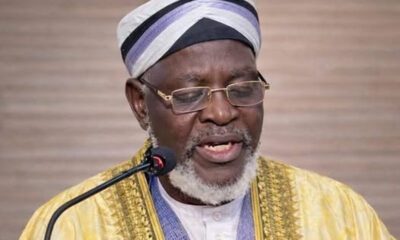
 metro2 days ago
metro2 days agoCourt Orders DIA to Produce Cleric Accused of Coup Plot by February 18
-

 metro1 day ago
metro1 day agoWoman Arrested Over Murder of Nigerian E-Hailing Driver in South Africa
-

 News3 days ago
News3 days agoMPAC Hails Supreme Court Verdict Affirming Muslim Students’ Right to Worship at RSU



